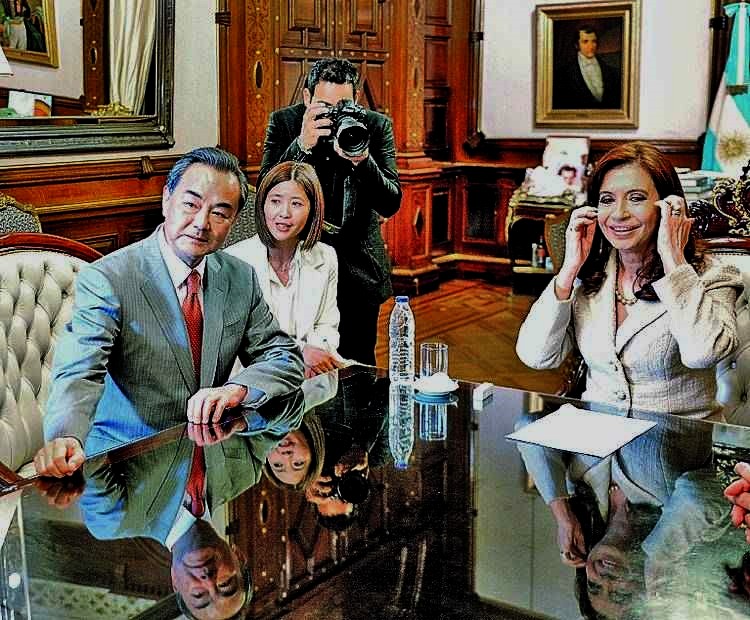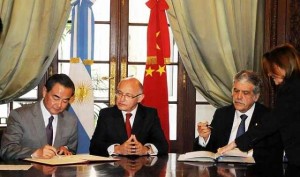
Chinese official stops in Argentina on way to Brazil
As part of a whirlwind diplomatic tour, Chinese Foreign Minister Wang Yi met Wednesday (April 23) in Buenos Aires with Argentine President Cristina Fernández de Kirchner and prepared to fly on to Brazil for talks with President Dilma Rousseff.
The presidential press office did not release any details about the talks, which included several members of Fernández’s cabinet.

The 45-minute meeting with Fernández came at the end of a busy day, in which Wang conferred with Argentine Foreign Minister Héctor Timerman and ministers Axel Kicillof (Economy) and Julio de Vido (Planning).
At that gathering, Wang confirmed a $2.4 billion credit line for railroad improvement projects and $4.7 billion for the construction of two dams in the province of Santa Cruz. Wang also expressed interest in investing on a third dam in the province of Neuquén.
Wang and De Vido signed an agreement of cooperation for the construction and operation of a Chinese observatory in Neuquén that will explore deep space and monitor Chinese space missions.
And the two foreign ministers agreed to cooperate further on matters of the economy, agriculture, energy, science and technology.
One important topic was the visit to Argentina of China’s president, Xi Jinpiang, perhaps on July 19, after Xi attends the summit in Brasilia of the BRICS (Brazil, Russia, India, China and South Africa).
Timerman said that Xi’s visit will be “a landmark in the history of the relations between our two countries.” He also expressed “the gratitude of the Argentine people for the constant support of [China] for our just claim” of sovereignty over the Malvinas Islands (the Falklands), now under British flag.
Timerman also said that Argentina coincides with China “with regard to the function of multilateral organizations such as the United Nations Security Council, the International Monetary Fund, the G-20, and the new relations between China and the CELAC [Community of Latin American and Caribbean States].
China will host a forum for CELAC members next September in Beijing.
Accompanying Wang throughout the day were the Chinese ambassador to Argentina, Yin Hengmin, and the head of the Chinese Foreign Ministry’s Latin American and Caribbean Section, Shen Zhiliang.
*****
Wang’s visit to Argentina, reported by Beijing
BUENOS AIRES, April 24 (Xinhua) — Visiting Chinese Foreign Minister Wang Yi and his Argentine counterpart, Hector Timerman, have agreed here to vigorously boost ties between their two countries.
China and Argentina, during recent years, have enjoyed ever-deepening political mutual trust, made outstanding achievements in mutually beneficial cooperation, gradually expanded humanistic exchanges and maintained close coordination on international affairs, Wang said when meeting Timerman on Wednesday.
He said the two countries should promote bilateral relations, deepen strategic cooperation, tap cooperation potential, realize common development and safeguard joint interests.
Timerman said developing strategic cooperation between Argentina and China was in the interests of both countries, and was the common aspiration of both peoples.
Timerman thanked China for its long-time support for Argentina.
The two sides agreed on a four-point proposal to vigorously boost bilateral ties on the occasion of the 10th anniversary of the establishment of a strategic partnership between China and Argentina.
Firstly, China and Argentina should maintain high-level exchanges to lead the development of bilateral ties, setting up a permanent council and a dialogue mechanism on economic cooperation and coordination between the two governments as soon as possible.
They should continue to firmly support each other on issues concerning their core interests.
Secondly, China and Argentina should deepen mutually beneficial cooperation, turning the advantage of their high-level political mutual trust into achievements of practical cooperation, to benefit the two peoples.
They agreed to expand trade and boost cooperation on major projects in such areas as agriculture, infrastructure construction, energy, science and technology and finance.
China expects Argentina to create a more favorable investment environment for Chinese companies, while Argentina welcomes Chinese companies to invest in the country.
Thirdly, the two countries should strengthen communication and cooperation in culture, education and tourism, and at a local level, to deepen friendship and mutual understanding between the two peoples.
Finally, China and Argentina agreed to maintain close strategic coordination on regional and international affairs, beef up cooperation within the framework of international organizations such as the U.N. and G20, safeguard the interests of developing nations and push for a more just and rational world order.
The two countries also pledged to join efforts to boost cooperation between China and the Latin American region and the construction of a China-Latin America forum.

